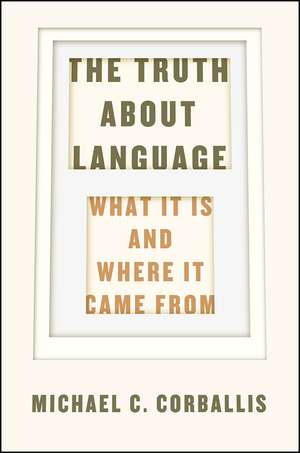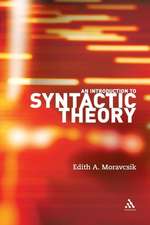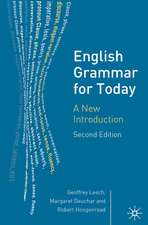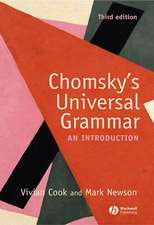The Truth about Language: What It Is and Where It Came From
Autor Michael C. Corballisen Limba Engleză Hardback – 15 mai 2017
Evolutionary science has long viewed language as, basically, a fortunate accident—a crossing of wires that happened to be extraordinarily useful, setting humans apart from other animals and onto a trajectory that would see their brains (and the products of those brains) become increasingly complex.
But as Michael C. Corballis shows in The Truth about Language, it’s time to reconsider those assumptions. Language, he argues, is not the product of some “big bang” 60,000 years ago, but rather the result of a typically slow process of evolution with roots in elements of grammatical language found much farther back in our evolutionary history. Language, Corballis explains, evolved as a way to share thoughts—and, crucially for human development, to connect our own “mental time travel,” our imagining of events and people that are not right in front of us, to that of other people. We share that ability with other animals, but it was the development of language that made it powerful: it led to our ability to imagine other perspectives, to imagine ourselves in the minds of others, a development that, by easing social interaction, proved to be an extraordinary evolutionary advantage.
Even as his thesis challenges such giants as Chomsky and Stephen Jay Gould, Corballis writes accessibly and wittily, filling his account with unforgettable anecdotes and fascinating historical examples. The result is a book that’s perfect both for deep engagement and as brilliant fodder for that lightest of all forms of language, cocktail party chatter.
But as Michael C. Corballis shows in The Truth about Language, it’s time to reconsider those assumptions. Language, he argues, is not the product of some “big bang” 60,000 years ago, but rather the result of a typically slow process of evolution with roots in elements of grammatical language found much farther back in our evolutionary history. Language, Corballis explains, evolved as a way to share thoughts—and, crucially for human development, to connect our own “mental time travel,” our imagining of events and people that are not right in front of us, to that of other people. We share that ability with other animals, but it was the development of language that made it powerful: it led to our ability to imagine other perspectives, to imagine ourselves in the minds of others, a development that, by easing social interaction, proved to be an extraordinary evolutionary advantage.
Even as his thesis challenges such giants as Chomsky and Stephen Jay Gould, Corballis writes accessibly and wittily, filling his account with unforgettable anecdotes and fascinating historical examples. The result is a book that’s perfect both for deep engagement and as brilliant fodder for that lightest of all forms of language, cocktail party chatter.
Preț: 216.49 lei
Nou
Puncte Express: 325
Preț estimativ în valută:
41.45€ • 43.16$ • 34.39£
41.45€ • 43.16$ • 34.39£
Carte disponibilă
Livrare economică 23 ianuarie-06 februarie
Livrare express 09-15 ianuarie pentru 33.90 lei
Preluare comenzi: 021 569.72.76
Specificații
ISBN-13: 9780226287195
ISBN-10: 022628719X
Pagini: 288
Ilustrații: 10 halftones
Dimensiuni: 152 x 229 x 28 mm
Greutate: 0.54 kg
Ediția:1
Editura: University of Chicago Press
Colecția University of Chicago Press
ISBN-10: 022628719X
Pagini: 288
Ilustrații: 10 halftones
Dimensiuni: 152 x 229 x 28 mm
Greutate: 0.54 kg
Ediția:1
Editura: University of Chicago Press
Colecția University of Chicago Press
Notă biografică
Michael C. Corballis is professor emeritus of psychology at the University of Auckland, New Zealand, and the author of many books, including The Wandering Mind and A Very Short Tour of the Mind: 21 Short Walks around the Human Brain.
Cuprins
Preface
Part One: Background to the Problem1 The Rubicon
2 Language as Miracle
3 Language and Natural Selection
Part Two: The Mental Prerequisites
4 Thinking without Language
5 Mind Reading
6 Stories
Part Three: Constructing Language
7 Hands On to Language
8 Finding Voice
9 How Language Is Structured
10 Over the Rubicon
Notes
Bibliography
Index
Recenzii
"Corballis writes with an academic's attention to detail in witty, self-deprecating prose. The combination of style and argument make The Truth about Language the best work yet on the gestural theory of language."
"Using a wealth of well-researched anecdotes about Neanderthals, cave paintings, gesturing apes, and well-trained border collies (to name a few), Corballis exemplifies moments of the human and animal minds fine-tuning their abilities to communicate. His journey into the written world is equally broad and insightful. . . . Exhilarating and illuminating. Corballis's deluge of well-organized facts and ideas are a thrill to read. . . . The truth about language is that there's still so much to learn. A fine, accessible introduction to a captivating, and still evolving, academic field."
"Corballi's's book is recommended reading for everyone interested in
what language is and where it comes from. I also liked the puns from a wise, successful man looking back on his career and at the ways the world around him is evolving."
what language is and where it comes from. I also liked the puns from a wise, successful man looking back on his career and at the ways the world around him is evolving."
"In this wonderfully written book, distinguished scholar Michael Corballis interweaves arguments from cognitive psychology, neuroscience, paleontology, anthropology, genetics, primatology and linguistics to make a strong and timely statement: Chomsky's view of language as an innate capacity for internal thinking leaves the question of the evolutionary emergence of language in the realm of mystery. Conceptualizing language as a socially constructed tool for the communication of experience, coupled with the hypothesis--made famous in From Hand to Mouth and seriously updated here--that spoken language emerged from manual gesture, turns the mystery into a scientific question, and allows for an elegant, detailed and thought-provoking account of how our ancestors crossed the Rubicon of language."
"An insightful and engaging book that challenges traditional perspectives on the nature of language and its origin. Michael Corballis offers a compelling argument for the gradual evolution of what many regard as our most distinct faculty."
"The word 'truth' in the title implies that there are misperceptions to be corrected. These include those of Robert Berwick and Noam Chomsky who, in Why Only Us approach language and evolution with an undue emphasis on Merge and with no concern for mental time travel and the linkage of brain and hand whose importance is so engagingly emphasized by Corballis."












